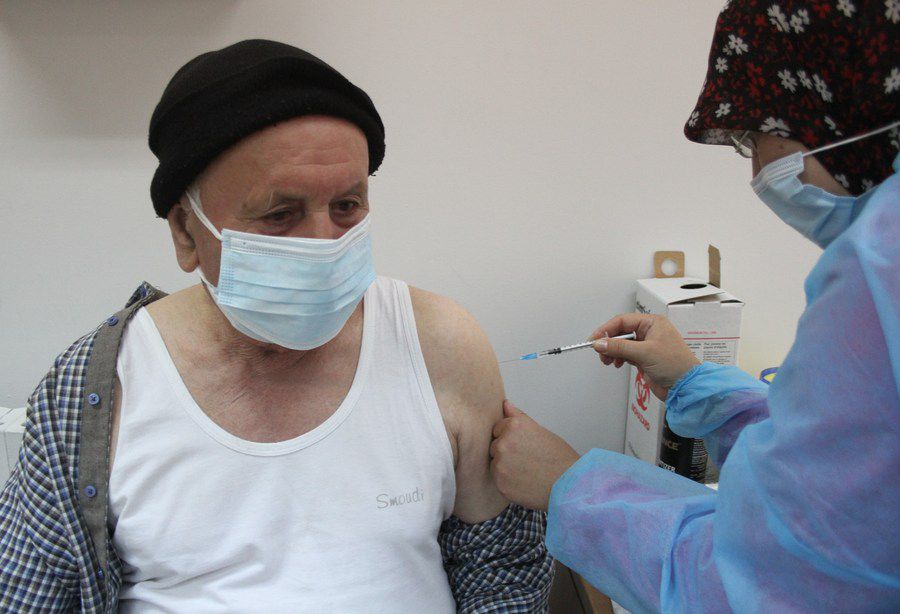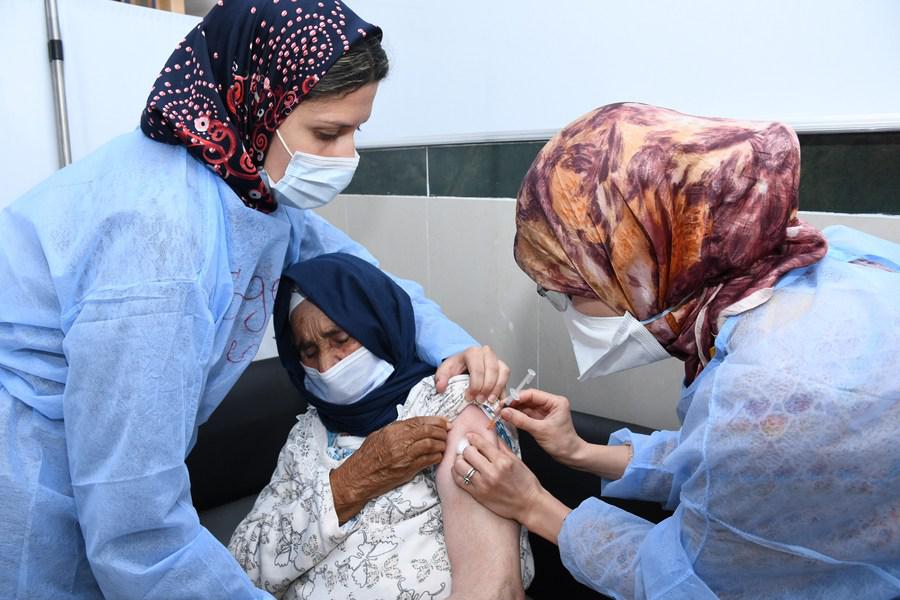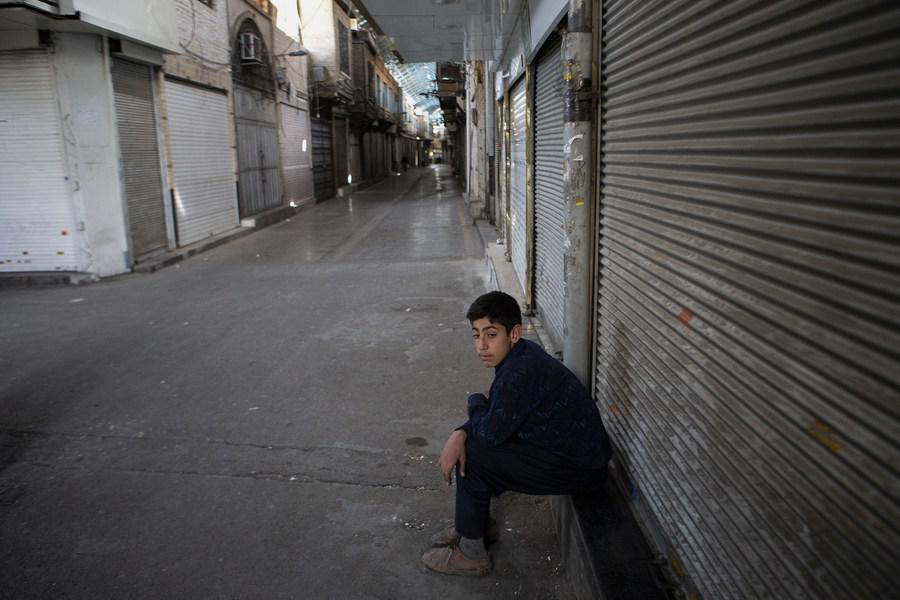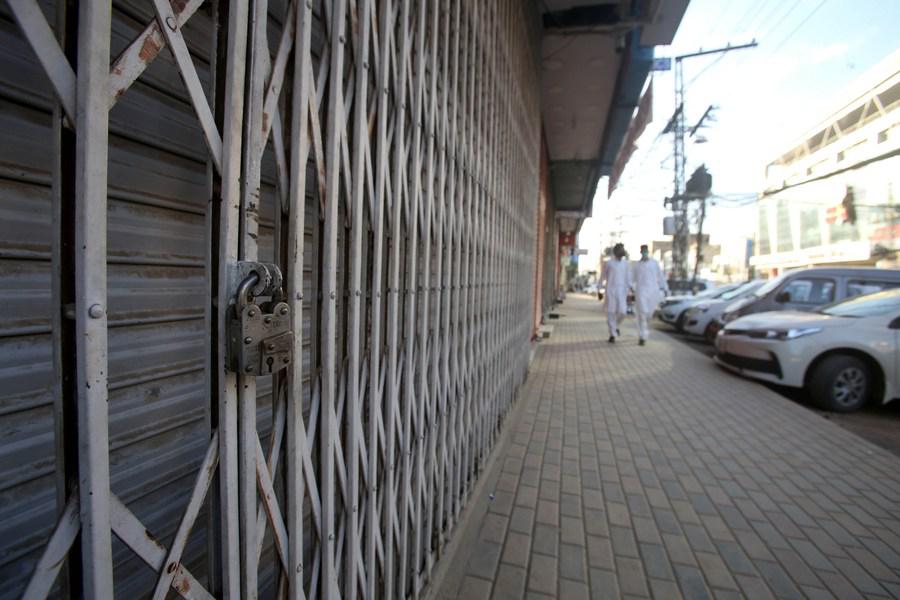Interview: IMF official warns lack of vaccination in low-income economies hurts all

A man receives a dose of the COVID-19 vaccine at a hospital in Tripoli, northern Lebanon, on April 9, 2021. (Photo by Khaled/Xinhua)
"The other reason that it's so important to have access everywhere including in low-income and emerging economies is that, in the absence of that, the pandemic will just drag on and then there'll be new mutants," said Petya Koeva Brooks, deputy director of the IMF's Research Department.
"And that would hurt everybody, including advanced economies," she added.
WASHINGTON, April 12 (Xinhua) -- It is important for low-income and emerging economies to have more access to vaccination, an International Monetary Fund (IMF) official has said, warning that without widespread vaccination, the pandemic will not end, which would hurt all.
There is uncertainty surrounding global economic forecasts, and the chief source of that uncertainty is the path of the pandemic and the vaccination process, Petya Koeva Brooks, deputy director of the IMF's Research Department, told Xinhua in a recent interview.
The latest World Economic Outlook (WEO) report released last week projects that the global economy will grow by 6 percent in 2021, 0.5 percentage point above the January forecast, with the progress of vaccination rollout in some countries and additional fiscal support in large economies, particularly the United States.
The IMF's baseline assessment is that advanced economies, as well as some emerging markets, will enjoy wide availability of vaccines in the second half of this year, but it will not happen to the rest of the world only till 2022 or even beyond, Brooks said.
In a downside scenario, with delayed vaccination and a more difficult path of the pandemic, the global economy is expected to grow by 4.5 percent, 1.5 percentage points lower than in the baseline projection, according to Brooks.
"I think we are hoping, and we are calling for stepped up production of vaccines and exchange of information in that area," she said.

A woman receives the COVID-19 vaccine in Rabat, Morocco, on April 8, 2021. (Photo by Chadi/Xinhua)
The IMF official noted that excess vaccines in advanced economies should be channeled to low-income countries, and policymakers should also make sure that the COVAX facility, an international initiative co-led by the World Health Organization and partners to ensure equitable global access to COVID-19 vaccines, is fully funded.
"The other reason that it's so important to have access everywhere including in low-income and emerging economies is that, in the absence of that, the pandemic will just drag on and then there'll be new mutants," Brooks said.
"And that would hurt everybody, including advanced economies," she continued. "So in that sense, it's also in the self-interest of advanced economies to help as much as possible."
Aside from the virus, Brooks highlighted other risks to global economic recovery, such as trade and technology tensions.
"I think now, more than ever, we think that the global economy would benefit from a more open, stable, transparent, and rules-based international trade system," she said.

A boy sits by closed shops at the Grand Bazaar in Tehran, Iran, April 10, 2021. (Photo by Ahmad Halabisaz/Xinhua)
According to the latest WEO report, recoveries are diverging dangerously across and within countries, as economies with slower vaccine rollout, more limited policy support, and more reliance on tourism do less well.
Brooks said the main worrying thing is that the progress low-income countries and some emerging markets had made to catch up the income of advanced economies "is at risk of being undone with this crisis," Brooks said.
The IMF official noted that part of the reason for the slow recoveries in low-income and some emerging economies lies with the financial support they have been able to provide domestically.
The world as a whole has provided fiscal support that accounts for 9 percent of GDP, according to Brooks. In advanced economies, that number is over 16 percent, while in low-income countries, that number is 1.7 percent. "That's an issue," she said.
The multilateral institution has so far supported 86 countries with over 110 billion dollars, using a variety of instruments, and it has planned to propose a new Special Drawing Rights allocation of 650 billion dollars to help meet the long-term global need to supplement reserves, according to the IMF website.

Photo taken on April 9, 2021 shows a closed shop in Rawalpindi of Pakistan's Punjab province. (Xinhua/Ahmad Kamal)
The WEO report noted that uneven recoveries are also occurring within countries as young and lower-skilled workers remain more heavily affected, and women have suffered more, especially in emerging markets and developing economies.
The crisis has also revealed that the social safety nets would need to be enhanced on a more permanent basis to work against poverty observed during the crisis, Brooks told Xinhua.
The latest WEO report projected that the Chinese economy will grow by 8.4 percent in 2021, 0.3 percentage point above the January forecast.
The upward revision reflects improved external environment with stronger global growth, according to the report.
"Another positive factor is that we're seeing more demand for pandemic-related goods than what we had anticipated previously," Brooks said, noting that the pandemic is lasting longer than expected.
Photos
Related Stories
- Philippines receives more Sinovac vaccines purchased from China
- Interview: IMF official deems global vaccination highest return public investment project
- More than enough vaccines for adults under-30s in UK: health secretary
- Brazil to enhance job training for low-income citizens
- 39,000 shopping Vouchers free for low-income households
Copyright © 2021 People's Daily Online. All Rights Reserved.










